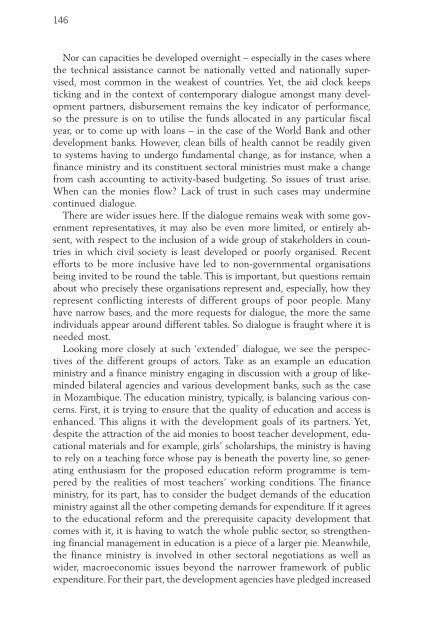Dialogue in Pursuit of Development - Are you looking for one of ...
Dialogue in Pursuit of Development - Are you looking for one of ...
Dialogue in Pursuit of Development - Are you looking for one of ...
Create successful ePaper yourself
Turn your PDF publications into a flip-book with our unique Google optimized e-Paper software.
146<br />
Nor can capacities be developed overnight – especially <strong>in</strong> the cases where<br />
the technical assistance cannot be nationally vetted and nationally supervised,<br />
most common <strong>in</strong> the weakest <strong>of</strong> countries. Yet, the aid clock keeps<br />
tick<strong>in</strong>g and <strong>in</strong> the context <strong>of</strong> contemporary dialogue amongst many development<br />
partners, disbursement rema<strong>in</strong>s the key <strong>in</strong>dicator <strong>of</strong> per<strong>for</strong>mance,<br />
so the pressure is on to utilise the funds allocated <strong>in</strong> any particular fiscal<br />
year, or to come up with loans – <strong>in</strong> the case <strong>of</strong> the World Bank and other<br />
development banks. However, clean bills <strong>of</strong> health cannot be readily given<br />
to systems hav<strong>in</strong>g to undergo fundamental change, as <strong>for</strong> <strong>in</strong>stance, when a<br />
f<strong>in</strong>ance m<strong>in</strong>istry and its constituent sectoral m<strong>in</strong>istries must make a change<br />
from cash account<strong>in</strong>g to activity-based budget<strong>in</strong>g. So issues <strong>of</strong> trust arise.<br />
When can the monies flow? Lack <strong>of</strong> trust <strong>in</strong> such cases may underm<strong>in</strong>e<br />
cont<strong>in</strong>ued dialogue.<br />
There are wider issues here. If the dialogue rema<strong>in</strong>s weak with some government<br />
representatives, it may also be even more limited, or entirely absent,<br />
with respect to the <strong>in</strong>clusion <strong>of</strong> a wide group <strong>of</strong> stakeholders <strong>in</strong> countries<br />
<strong>in</strong> which civil society is least developed or poorly organised. Recent<br />
ef<strong>for</strong>ts to be more <strong>in</strong>clusive have led to non-governmental organisations<br />
be<strong>in</strong>g <strong>in</strong>vited to be round the table. This is important, but questions rema<strong>in</strong><br />
about who precisely these organisations represent and, especially, how they<br />
represent conflict<strong>in</strong>g <strong>in</strong>terests <strong>of</strong> different groups <strong>of</strong> poor people. Many<br />
have narrow bases, and the more requests <strong>for</strong> dialogue, the more the same<br />
<strong>in</strong>dividuals appear around different tables. So dialogue is fraught where it is<br />
needed most.<br />
Look<strong>in</strong>g more closely at such ‘extended’ dialogue, we see the perspectives<br />
<strong>of</strong> the different groups <strong>of</strong> actors. Take as an example an education<br />
m<strong>in</strong>istry and a f<strong>in</strong>ance m<strong>in</strong>istry engag<strong>in</strong>g <strong>in</strong> discussion with a group <strong>of</strong> likem<strong>in</strong>ded<br />
bilateral agencies and various development banks, such as the case<br />
<strong>in</strong> Mozambique. The education m<strong>in</strong>istry, typically, is balanc<strong>in</strong>g various concerns.<br />
First, it is try<strong>in</strong>g to ensure that the quality <strong>of</strong> education and access is<br />
enhanced. This aligns it with the development goals <strong>of</strong> its partners. Yet,<br />
despite the attraction <strong>of</strong> the aid monies to boost teacher development, educational<br />
materials and <strong>for</strong> example, girls’ scholarships, the m<strong>in</strong>istry is hav<strong>in</strong>g<br />
to rely on a teach<strong>in</strong>g <strong>for</strong>ce whose pay is beneath the poverty l<strong>in</strong>e, so generat<strong>in</strong>g<br />
enthusiasm <strong>for</strong> the proposed education re<strong>for</strong>m programme is tempered<br />
by the realities <strong>of</strong> most teachers’ work<strong>in</strong>g conditions. The f<strong>in</strong>ance<br />
m<strong>in</strong>istry, <strong>for</strong> its part, has to consider the budget demands <strong>of</strong> the education<br />
m<strong>in</strong>istry aga<strong>in</strong>st all the other compet<strong>in</strong>g demands <strong>for</strong> expenditure. If it agrees<br />
to the educational re<strong>for</strong>m and the prerequisite capacity development that<br />
comes with it, it is hav<strong>in</strong>g to watch the whole public sector, so strengthen<strong>in</strong>g<br />
f<strong>in</strong>ancial management <strong>in</strong> education is a piece <strong>of</strong> a larger pie. Meanwhile,<br />
the f<strong>in</strong>ance m<strong>in</strong>istry is <strong>in</strong>volved <strong>in</strong> other sectoral negotiations as well as<br />
wider, macroeconomic issues beyond the narrower framework <strong>of</strong> public<br />
expenditure. For their part, the development agencies have pledged <strong>in</strong>creased

















![CynefinFramework final [Read-Only]](https://img.yumpu.com/19017304/1/190x135/cynefinframework-final-read-only.jpg?quality=85)